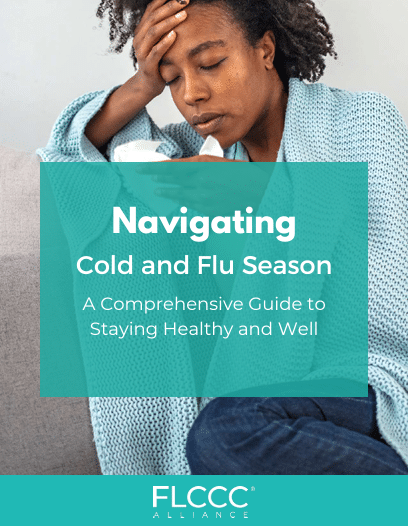Want to stay healthy in cold and flu season? Here are 10 tips to boost immunity and fend off any illness that comes your way.

Nobody likes getting sick. But ever since COVID, people have renewed interest in health care. That interest has pushed many to seek out advice online.
And since the FLCCC Alliance spends a lot of time focused on immunity and prevention, this is the perfect place for us to lend our expertise.
At this point, most people know the basics of protecting yourself during cold and flu season:
- Stay home if you are sick
- Wash your hands
- Avoid close contact with sick people
While those are good techniques, they don’t do anything to boost the immune system. So, we put together a guide that covers that and a lot more!
Click the guide below to learn all the ways to stay healthy during cold and flu season. Or keep scrolling for some highlights.
10 Tips to Stay Healthy During Cold and Flu Season
There’s a lot you can do to stay healthy and help prevent the spread of germs. The secret: boost your immunity. Here’s a list of things you can do right now. The best part is that none of these practices are expensive or time consuming!
- Stay Hydrated
- Get Enough Sleep
- Reduce Stress
- Regular Exercise
- Rest and Self-Care
- Vitamin D
- Probiotics
- Herbal Remedies
- Steam Inhalation
- Hygiene Practices
1. Stay Hydrated
Drinking plenty of water helps keep your respiratory system and mucous membranes moist, which can help defend against viruses. Herbal teas with immune-boosting herbs like echinacea or elderberry can also be soothing.
2. Get Enough Sleep
Prioritize sleep to allow your body to rest and repair. Aim for 7-9 hours of quality sleep each night to help your immune system function optimally.
3. Manage Your Stress
Chronic stress can weaken your immune system. Practice stress reduction techniques such as meditation, deep breathing exercises, yoga, or mindfulness to keep stress levels in check.
4. Regular Exercise
Engaging in regular, moderate exercise can boost your immune system and improve overall health. However, avoid excessive or intense exercise when you’re feeling unwell, as it may weaken your immune response.
5. Rest and Self-Care
Listen to your body. If you start feeling unwell, rest, and prioritize self-care. Give your body the time it needs to recover.
6. Vitamin D
Adequate vitamin D levels are crucial for immune function. Try to get some sunlight exposure, and consider taking a vitamin D supplement if you have limited sun exposure, especially during the winter months.
7. Probiotics
A healthy gut is essential for a strong immune system. Consuming probiotic-rich foods like yogurt, kefir, sauerkraut, and kimchi can promote gut health.
8. Herbal Remedies
Certain herbs and supplements, such as echinacea, elderberry, garlic, and astragalus, are believed to have immune-boosting properties. Consult with a healthcare professional before using supplements, especially if you have underlying health conditions or are taking medication.
Learn more:
9. Steam Inhalation
Inhaling steam from a bowl of hot water can help relieve nasal congestion and soothe a sore throat. You can add a few drops of essential oils like eucalyptus or tea tree oil to enhance the effect.
10. Hygiene Practices
Besides handwashing, consider using a saline nasal spray to keep your nasal passages moist and clear. Gargling with warm saltwater can help soothe a sore throat. There’s no need to wipe down your groceries or use excessive hand sanitizer though!
Foods for Cold and Flu Season
If you find yourself coughing or sneezing, there are some great foods you can add to your diet to stay healthy for flu and cold season:
- Berries
- Foods rich in Vitamin C
- Leafy Greens
- Fish
- Nuts and Seeds
1. Berries
Berries like blueberries, raspberries, blackberries, and strawberries are packed with antioxidants that help reduce inflammation in the body and support the immune system.
2. Foods rich in Vitamin C
Citrus fruits like oranges, limes, grapefruits, and lemons, are LOADED with Vitamin C – one of nature’s most powerful antioxidants. Also on the list: kiwis, bell peppers, and cauliflower
3. Leafy Greens
Leafy greens such as spinach, kale, arugula, and Swiss chard are high in Vitamin A and Vitamin C as well as other essential vitamins and minerals that support immunity
4. Fish
Fish like salmon, sardines, mackerel, trout, and anchovies are rich in omega-3 fatty acids, which have been shown to reduce inflammation in the body while boosting immune function.
5. Nuts and Seeds
Nuts and seeds like walnuts, almonds, and sunflower seeds are high in zinc, which has been found to be effective in reducing the severity of coughs and colds.
Should You Get A Flu Vaccine Each Year?
The Centers for Disease Control (CDC) recommends getting the flu shot. In fact, it’s their number one guidance for the flu.
But is that really the best thing to do? The guidance coming from our public health institutions has been flawed in many ways. The mishandling of COVID (including ignoring the data on COVID vaccine harm) has created many skeptics, among them Dr. Marik and Dr. Kory, FLCCC’s founding members.
And because of that growing skepticism, FLCCC’s members have changed their minds about virtually all vaccines. Here’s what they had to say about the flu vaccine:
If you’ve noticed conflicts in what the CDC recommends, you aren’t alone. Besides, when it comes to their flu recommendations, they seem to ignore the fact that we all have immune systems
Wrapping Up
As you can see, there’s a lot that everyone can do to stay healthy in cold and flu season. For more health tips, check out all our tools & guides and tune into our blog!



